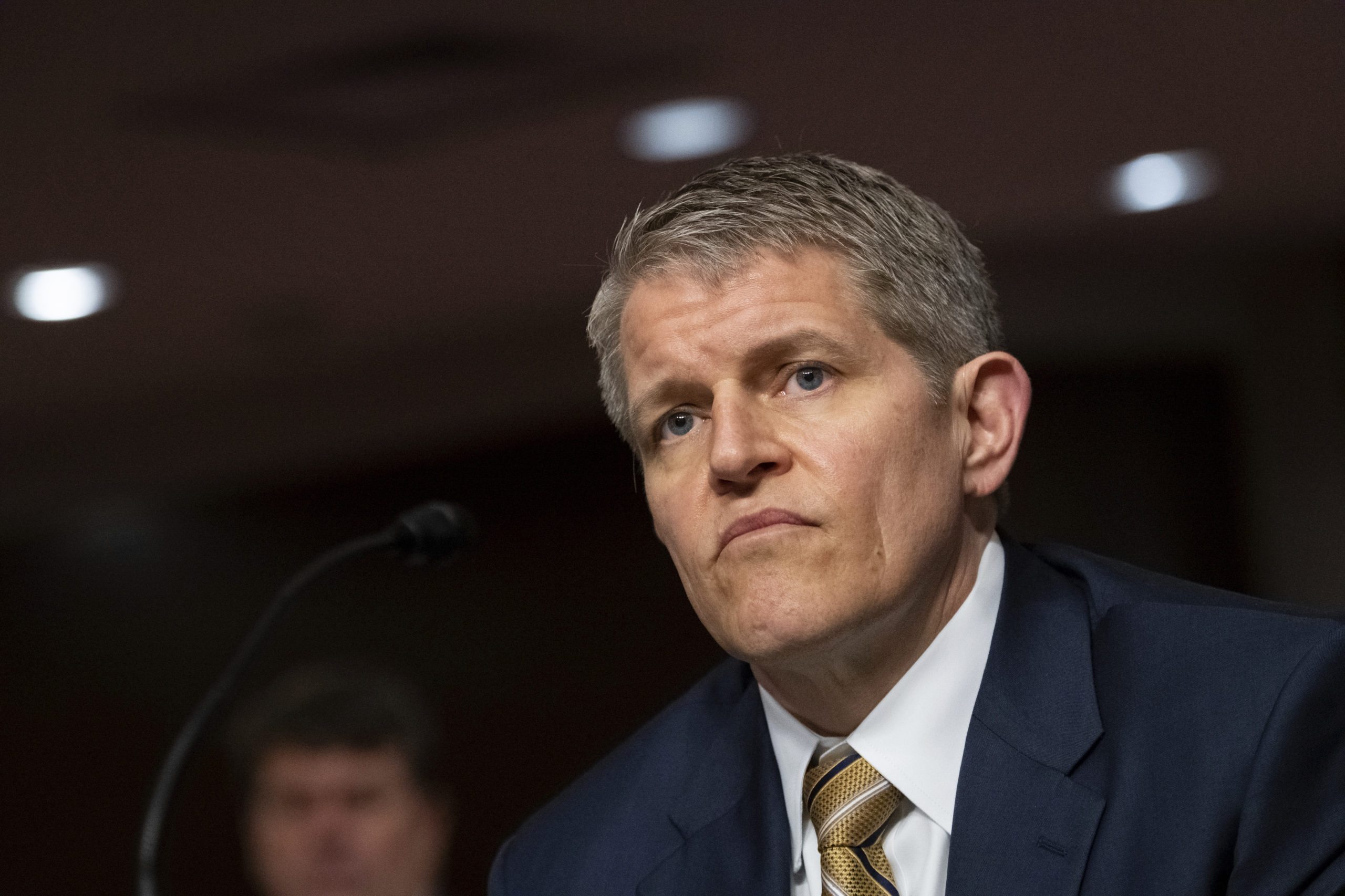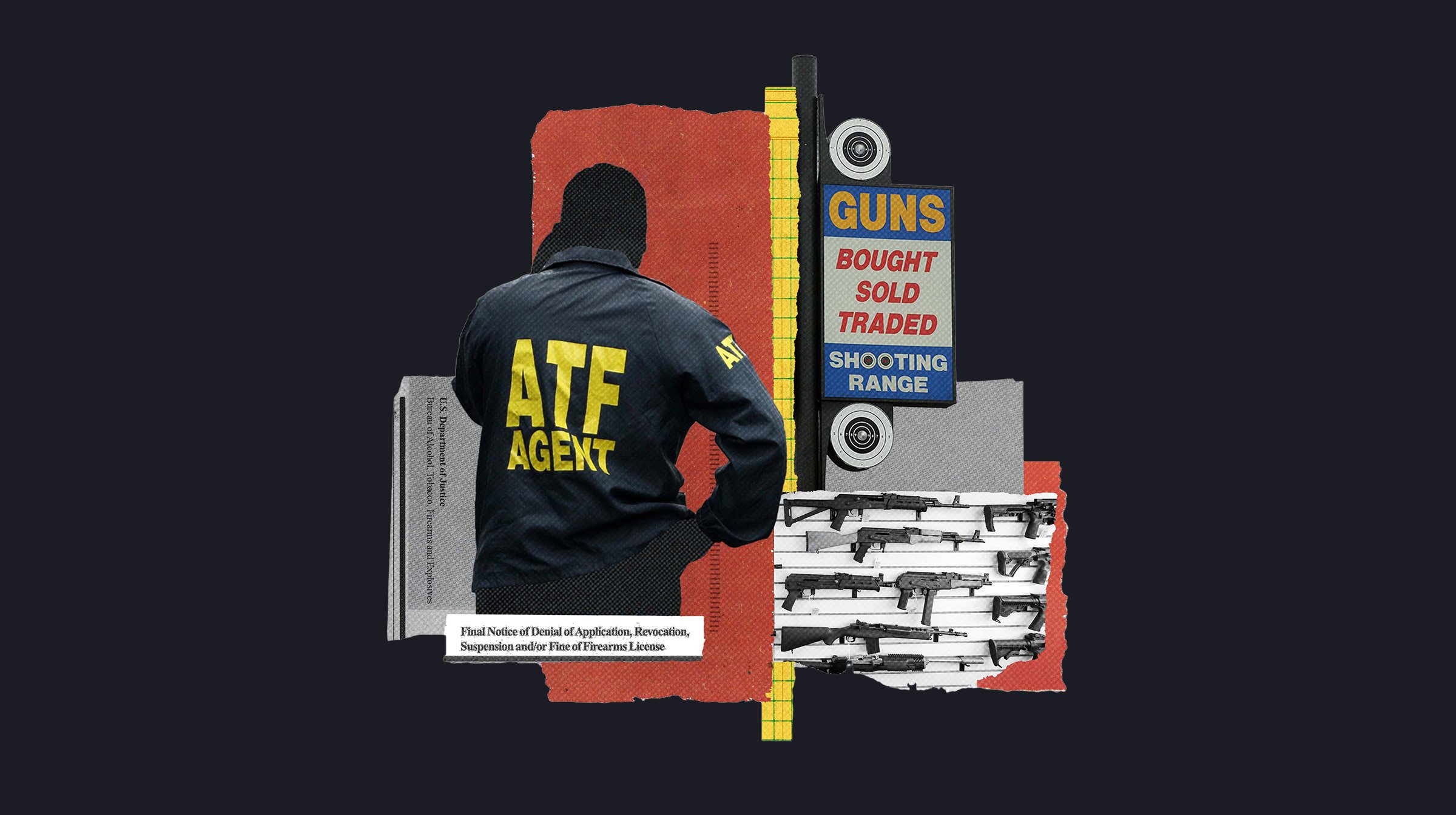President Joe Biden’s pick to lead the Justice Department’s gun agency hinges on a final decision by Senator Angus King, an independent from Maine, that could kneecap a key plank of the gun violence prevention agenda.
David Chipman, a former agent with the Bureau of Alcohol, Tobacco and Firearms, has faced a steady drumbeat of allegations since his nomination in April, ranging from complaints that he made discriminatory comments about Black agents during his tenure to fears that he would attempt to radically limit Second Amendment rights.
Chipman’s supporters launched a final full-court press on King with private meetings this week at the end of a bruising nomination, which had featured millions spent in lobbying on TV, radio and the internet, alongside disinformation about the former agent and his family that turned bizarre and threatening.
Advocates are hoping for a floor vote before the Senate breaks for its August recess this weekend. All Republicans are expected to vote against the nominee, meaning Senate Leader Chuck Schumer could afford no defections if he is to eke out a tie that could be broken by Vice President Kamala Harris.
Republicans maintain that Chipman’s recent work with gun control groups like Everytown and Giffords disqualify him from the position that holds law enforcement power over the nation’s gun manufacturers, importers, and sellers. (Everytown provides grants through its nonpolitical arm to The Trace, which partnered with USA TODAY in this coverage).
White House Press Secretary Jen Psaki said the president knew the Chipman nomination “wouldn’t be easy,” citing the lack of a confirmed director for the last six years. “We’ve been eyes wide open into the challenge from the beginning,” she said Wednesday at the White House press briefing.
When asked about the opposition by King, who caucuses with Democrats, she instead pointed to the GOP, “We are disappointed by the fact that many Republicans are moving in lockstep to try to hold up his nomination and handcuff the chief federal law enforcement agency tasked with fighting gun crimes.”
Gun control advocates said this week that the focus had shifted to King, despite unknown votes by other moderate Democrats, including Senator Joe Manchin from West Virginia and Montana’s Senator Jon Tester. Two leading gun violence prevention advocates met with King by phone Wednesday morning.
One of them was Fred Guttenberg, whose daughter was killed in the shooting at Marjory Stoneman Douglas High School in Parkland, Florida, in 2018. He’s been an outspoken supporter of Chipman and appeared with President Joe Biden in the Rose Garden in April to roll out the president’s gun control proposals.
After the meeting with King, Guttenberg told USA TODAY that he “gave us the time, and I think it mattered.”
“At this point, it’s on him to take any additional steps on a final decision because he has become the crucial piece in this conversation, and the gun lobby knows it,” Guttenberg said. “This has been ugly, and it’s not about the nominee. As someone who has to visit his daughter in the cemetery because of those tactics, I’m disgusted.”
Po Murray, an organizer with the advocacy group Newtown Action Alliance, said she told King on Wednesday to consider the views of families and survivors of gun violence “more than the smear campaign from the corporate gun lobby.”
David Trahan, executive director of Sportsman Alliance of Maine, said his influential gun-rights group of 50,000 members lobbied against Chipman hoping to sway King.
“Our biggest objection is over-politicizing a law enforcement agency and the ramifications it would have around the country to impact a fragile relationship with groups like ours and gun owners,” Trahan said. “I served with (then Maine Governor) King in our state Legislature, and I know he’ll do what’s best for the country.”
A spokesperson for King, traditionally a Biden ally, said the senator “continues to review the nomination” and declined to say if he’d meet again with Chipman.
Chipman would have oversight of both the ATF’s law enforcement investigations and regulatory infrastructure to hold the nation’s gun shops accountable. A recent USA TODAY/The Trace investigation highlighted the lax punishment many of the worst offenders face after inspections.
No new hearing despite calls for more info
The political fight picked up steam this week with Republican Senator Chuck Grassley of Iowa and others calling either for a second hearing for Chipman or for the White House to withdraw the nomination.
That came on the heels of answers to Senator Ted Cruz of Texas about two Equal Employment Opportunity complaints from ATF employees alleging discrimination by Chipman. In written testimony, Chipman acknowledged that he was the subject of the complaints, but said both “were resolved without any finding of discrimination and no disciplinary action was taken against me.”
Conservative media outlets and a gun-rights website amplified the complaints and concerns over Chipman’s interaction about Black recruits to the agency.
Tom Jones, president of the American Accountability Foundation – a conservative group that does opposition research on Biden nominees – said the group had filed a Freedom of Information Act lawsuit for Chipman’s personnel files.
“AAF has known for months that David Chipman is a toxic nominee and unfit to lead the agency,” Jones said in a statement. “Make no mistake: his history of racist and derogatory comments have only come to the public’s awareness because of AAF’s tireless efforts.”
Grassley and others also called for the ATF to release more personnel files. An ATF spokesperson said that, as a retired agent, Chipman’s full personnel file is held by the National Archives and generally not releasable without Chipman’s consent.
Chipman declined to comment for this article.
In response to calls for both another hearing and allegations of discrimination, Senate Judiciary Chairman Dick Durbin of Illinois wrote Monday that the effort was part of a campaign to “derail Mr. Chipman’s nomination and tarnish his record and reputation.” He said he would not hold another session.
Durbin also took time to point out disinformation distributed by Chipman’s opponents throughout the nomination.
He cited a widely circulated image of an armed FBI agent standing at the Branch Davidians compound in Waco, Texas, who was erroneously identified as Chipman, and a report that Chipman had misplaced his service weapon as an ATF agent – a claim denied by Chipman and the agency.
On Wednesday, Fox News published a report accusing Chipman of intentionally hiding an appearance on Chinese television from 2012, which quickly took off on social media with charges of treason and memes depicting the former ATF agent as Chairman Mao.
A group of Republican congressmen led by Montana’s Representative Matt Rosendale distributed a draft impeachment document to file against Chipman should he be confirmed, alleging he will fail to defend the Second Amendment and that he lied to Congress when he denied losing his service weapon while on duty.
Gun-rights groups added pressure. The National Shooting Sports Foundation, a gun industry trade group, ran television ads against Chipman in West Virginia and Maine, and the National Rifle Association urged members to tell their senators to reject his nomination.
Confirmation spilled into Chipman’s personal life
The nomination fight brought out waves of hyperbolic memes featuring Chipman in vulgar settings. His presence at the Waco siege days after the violence was merged into misinformation that is digitally tethered online to his image as “Crispy Kids Chipman” and “Waco Dave.”
Others took aim at Chipman’s wife, Tara, who until her retirement in July was a division chief in the ATF’s public affairs office. Anonymous bloggers and social media sleuths claimed victory for her resignation after posting about what they called a “massive conflict of interest.”
Tara Chipman told USA TODAY that she retired to avoid the conflict of working under her husband’s leadership or staying on in the aftermath of a failed nomination.
She cited cases of online harassment, including conspiracy theories tied to her mother, Olivia Cajero-Bedford, a former Democratic state senator in Arizona who proposed a ban on the bump stock devices now banned nationwide.
“The negative attention was more than either of us expected, especially me as a spouse,” Tara Chipman said Wednesday. “I don’t know why anyone would want a Senate-confirmed position in government.
“I feel kind of powerless because, of course, I want to go after these people, but I don’t want to do anything to endanger David’s nomination.”
In June, an anonymous Twitter user posted an address in Virginia that purportedly was the Chipmans’ home.
Tara Chipman said the address is actually a rental property the couple owns and she feared for her tenant. She reported the post to Twitter, but the company declined to remove it.
Confirmation always a long shot
Biden announced Chipman’s nomination in April, alongside executive actions to restrict homemade, unserialized “ghost guns” and the widely popular firearm accessory known as a pistol-stabilizing brace, used to kill 10 people at a Boulder, Colorado, supermarket in March.
Chipman had advocated similar measures. In 2018, for example, he co-authored a report calling for tighter controls on stabilizing braces and criticizing the ATF’s inconsistent approach to regulating them.
Many observers believe the odds were stacked against Chipman from the beginning, given his statements in favor of gun control.
“He has advocated an assault weapons ban, and there are a lot of pro-gun people who would never support him based on that fact alone,” said Norm Bergeron, a former ATF agent who retired in 2017. “With the Senate essentially split 50-50, it doesn’t take much to hold up a confirmation, and everybody has their own opinion.”
During his June confirmation hearing, GOP members of the Senate Judiciary Committee lambasted Chipman for his gun control advocacy work and past statements on firearm ownership, including when he compared first-time gun buyers to zombie apocalypse preppers.
Grassley, the committee’s top Republican, said giving Chipman reign over the ATF was “like putting a tobacco executive in charge of Health and Human Services or antifa in charge of the Portland Police Department.”
The committee ultimately deadlocked along party lines over advancing Chipman’s nomination, requiring Democrats to jump through procedural hoops to bring it to a vote by the full chamber.
The ATF has been overseen by a series of acting leaders since 2006, when gun lobbyists swayed Congress to take away the president’s power to appoint the bureau’s director without Senate approval. Since then, every nomination has stalled with the exception of B. Todd Jones, who was confirmed in 2013 after an intense lobbying effort by Democrats.
Jones stepped down two years later, and President Barack Obama did not put forward a replacement. President Donald Trump tapped Chuck Canterbury, former head of the national Fraternal Order of Police, but eventually withdrew the nomination after Republicans expressed doubts over his commitment to gun rights.
“No matter who the nominee is, people are going to dig into their background and find one little thing that they said or one group that they may have connected with, and they’re going to exploit that for their own political means,” said Joseph Bisbee, a former ATF agent in Seattle.
Bisbee said the lack of confirmed leadership has undermined morale among the rank-and-file agents and made it difficult for the bureau to set long-term priorities.
“It would be nice to have someone who has the experience and exposure and knows what needs to be done and how to navigate it,” he said. “But the way it’s currently set up, I don’t know that that’s ever going to happen.”

